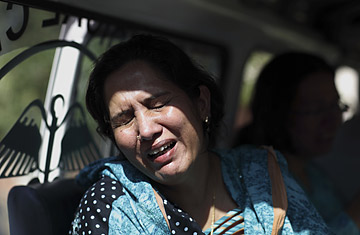
A woman cries next to the body of a person who was killed in a suicide attack in Islamabad on Oct. 5, 2009
In a shocking breach of security, a suicide bomber posing as a paramilitary soldier blew himself up Monday inside the heavily fortified offices of the United Nations World Food Program (WFP) in a tightly controlled part of the Pakistani capital of Islamabad, killing at least five of the humanitarian agency's staff, Pakistani officials said.
The bombing, the latest in a series of troubling attacks on foreign aid workers in Pakistan and Afghanistan in recent months, came as the Pakistani army is poised to mount a fresh ground offensive in the South Waziristan tribal area against the country's most fearsome al-Qaeda-linked Taliban militants. It also followed a vow by the Pakistani Taliban leader, Hakimullah Mehsud, on Sunday to mount revenge attacks for the killing of the group's former leader in a U.S. air strike two months ago. Addressing Pakistan's parliament after the bombing, Interior Minister Rehman Malik said that although security had been stepped up across the country, "we should expect a few more [attacks like this]."
The bomber in Monday's attack was nothing if not brazen. Malik told reporters gathered in front of the damaged building that the man had worn a military uniform and managed to get past guards at the WFP building by pleading with them to use the bathroom. The attack was made all the more surprising by the setting — President Asif Ali Zardari's private residence is located across the street from the WFP office — as well as the elaborate security measures that were put in place after last year's devastating bombing of the Marriott Hotel in Islamabad, which killed 60 people. Security officials installed high blast walls, thick iron gates and a fence topped with razor wire around the WFP building. Barriers were also set up at both ends of the street and manned with armed guards.
After slipping into the building, officials said the attacker detonated his explosive in the lobby just after noon, when about 100 staff members were at work. "There was a loud blast, a flash of light and the windows shattered," Dominique Frankefourt, the WFP's deputy country director, told TIME. "I was on the first floor of the two-story building. I told everyone to get out as quickly as possible. But when I came down to the ground floor, there were people lying on the floor who could not move." Four of those killed were Pakistani; the fifth victim was an Iraqi.
Over the past few years, foreign aid workers have increasingly become the targets of attacks in the region as militants have tried to drive relief programs out of the area. Earlier this year, a 21-year-old Afghan fighter who had trained in Quetta, the capital of Pakistan's Baluchistan province, tried to kill four American aid workers in a car bombing in Kandahar, Afghanistan. After his arrest, Shafiq Shah gave an interview to TIME in a Kabul prison in which he described the indoctrination that young fighters receive concerning the role of foreign aid workers. "[Muslim aid recipients] shouldn't eat infidel food," Shah said. "God gave us everything we need. We have bodies and hands and eyes and community — why can't those people work and get their own food? They shouldn't take anything from infidels."
The U.N. has been a favorite target of insurgents. In February, John Solecki, the head of the U.N. refugee agency's office in Baluchistan, was kidnapped by Baluch separatist fighters and held for two months before being released. In June, the U.N. was forced to pull its staff out of Peshawar, the capital of the lawless North-West Frontier Province, after a vehicle laden with explosives slammed into the side of a hotel in the city, killing 17 people. Just hours after Monday's attack, the U.N. said all of its offices in Islamabad would be closed indefinitely. That could severely hamper relief efforts just when refugees need it most. The WFP has been coordinating the distribution of food and other relief supplies to more than 2 million people who had fled the fighting between the Pakistani army and insurgents in the Swat Valley of the North-West Frontier Province this summer as well as organizing development projects throughout the country.
The Pakistani Taliban was thought to have been weakened when the group's former commander, Baitullah Mehsud, was killed in a U.S. drone attack on Aug. 5. Pakistani military officials have told TIME that "conditions in South Waziristan" are now ripe for a ground offensive to eliminate what remains of the Mehsud network and their allies there. But they warn that it will be "very bloody," possibly leading to further revenge attacks in Pakistan. There are an estimated 10,000 well-trained fighters still in South Waziristan, and their new leader, Hakimullah Mehsud, has warned of fresh violence. He appeared at a press conference in the remote South Waziristan village of Sara Rogha on Sunday and vowed to seek revenge for the slaying of Baitullah Mehsud, a distant relative.
Pakistan does not appear to be ready to take on the full array of militants in the region, though. The army has reaffirmed non-aggression pacts with Mullah Nazir, a commander based in South Waziristan along the Afghan border, and Hafiz Gul Bahadur in North Waziristan. The Haqqani network is also expected to remain passive during the imminent army operation. While it may ease Pakistan's task in South Waziristan, the deals will afford little comfort to U.S. military commanders in Afghanistan. All three militant commanders continue to mount cross-border attacks on U.S. and NATO troops there.
